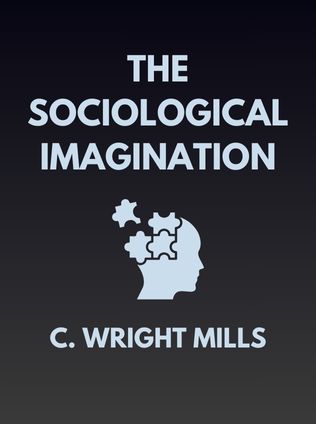
The Sociological Imagination
By C. Wright Mills
Published 01/1959
About the Author
C. Wright Mills was an American sociologist and a professor at Columbia University, widely recognized for his controversial works and his critical view on the sociological theories of his time. Born on August 28, 1916, in Waco, Texas, Mills became one of the most influential figures in American sociology during the mid-20th century. His notable works, such as "The Power Elite," "White Collar," and "The Sociological Imagination," highlight his deep concern for the impact of social structures on individuals and the intricate relationships between power, society, and individuals. Mills was known for his ability to provoke thought and inspire action among sociologists and the general public alike.
His writing style was direct and often critical, as he challenged the existing norms and urged social scientists to adopt a more holistic approach to understanding society. Mills believed that the role of the sociologist was not just to observe society but to actively engage with it, making his works a call to action for both scholars and citizens. "The Sociological Imagination," published in 1959, remains one of his most celebrated contributions, advocating for a perspective that connects individual experiences with broader social and historical forces.
Main Idea
"The Sociological Imagination" by C. Wright Mills is a profound exploration of the relationship between individual experiences and larger social forces. Mills argues that to understand life and society, one must develop what he calls a "sociological imagination"—the ability to see the connection between personal troubles and public issues. He criticizes contemporary sociology for its detachment from real-world issues and its failure to address the complexities of society. The book is a powerful critique of both grand theory and abstracted empiricism, urging sociologists to develop a more practical and engaged approach to their work.
Table of Contents
- Introduction
- The Promise
- Grand Theory
- Abstracted Empiricism
- Types of Practicality
- The Bureaucratic Ethos
- Philosophy and Science
- The Uses of History
- On Reason and Freedom
- Conclusion
The Promise
In the opening chapter, "The Promise," Mills introduces the concept of the sociological imagination and emphasizes its importance in understanding the world. He explains that personal troubles, which individuals experience in their daily lives, are often linked to larger public issues and social structures. Mills urges readers to shift their perspective from focusing solely on individual problems to understanding the broader societal context that shapes these issues. He states,
"Neither the life of an individual nor the history of a society can be understood without understanding both."
This quote encapsulates the essence of the sociological imagination—seeing the interplay between individual lives and the societal forces at play. By developing this perspective, Mills argues, people can better understand their own circumstances and the world around them.
Grand Theory
Mills critically examines what he calls "Grand Theory" in the second chapter. He argues that this approach to sociology, which attempts to create overarching theories that apply to all societies, is flawed. Grand Theorists, according to Mills, are too detached from the real world, focusing on abstract concepts that do little to help individuals understand their lives. This detachment renders their work irrelevant to the average person.
One of the main criticisms Mills has of Grand Theory is its tendency to oversimplify complex social phenomena. By attempting to fit every society into a single theoretical framework, Grand Theorists miss the nuances and unique aspects of different cultures and historical periods. As a result, their theories often fail to provide meaningful insights into specific social issues.
To illustrate the limitations of Grand Theory, Mills contrasts it with a more grounded approach that focuses on specific social problems. For example, instead of trying to explain the nature of all marriages, a sociologist should study the specific factors that lead to high divorce rates in a particular country. This approach, Mills argues, is more likely to produce useful insights that can inform social policy and help individuals navigate their lives.
Sign up for FREE and get access to 1,400+ books summaries.
You May Also Like
The Subtle Art of Not Giving a F*ck
A Counterintuitive Approach to Living a Good Life
By Mark MansonHow To Win Friends and Influence People
The All-Time Classic Manual Of People Skills
By Dale CarnegieFreakonomics
A Rogue Economist Explores the Hidden Side of Everything
By Steven D. Levitt and Stephen J. Dubner



















